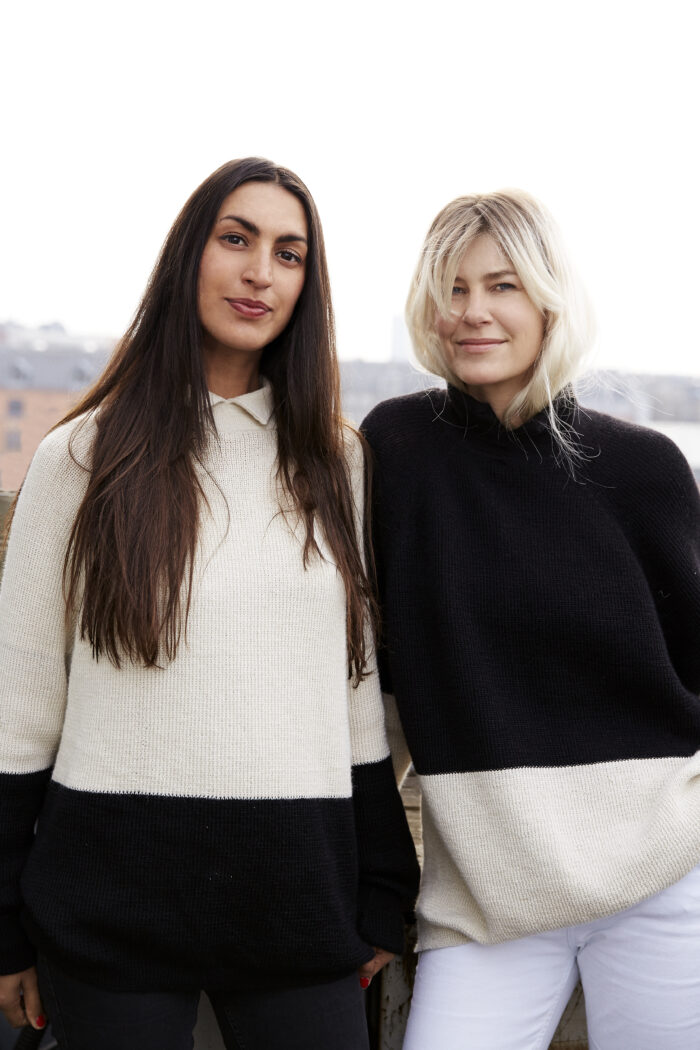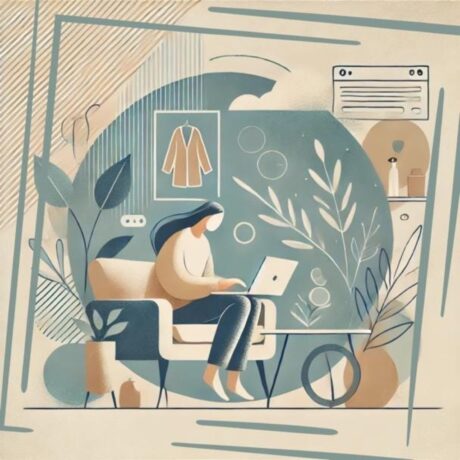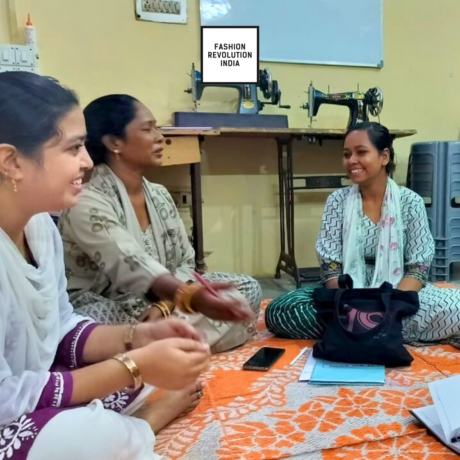Veronica D’Souza from Carcel to the fashion industry: “Dear industry – get ready!”
#WhoMadeMyClothes
Carcel* is a new exclusive Danish label built on a business model that challenges the ordinary textile manufacturing and stands up against some of the industry’s worst sins: pollution, mass production, and poor working conditions. The concept of Carcel is a sustainable approach towards materials, season-less garment cycles and a socially responsible production – All the garments of Carcel are made by women in prison.
Written by Christine Lembcke Petersen, Fashion Revolution Denmark
Translated by Johanne Jacobsen
The grey concrete wall and steel fences are a huge contrast to the colourful alpaca cones, which are decorating the fences in the backyard of the prison. The Peruvian accent is a clear sign of location and the women are loudly chatting and joking in the workspace inside the local prison in Cusco. The women are working on industrial knitting machines, during one day they each can make between one and three finished pieces of cloths. They work with the softest baby alpaca locally sourced in Peru. The work conditions in the prison are very different from what bought them there, poverty-related crimes, mainly drug trafficking. But the years behind bars have now turned into a place for new opportunities and a brighter future.
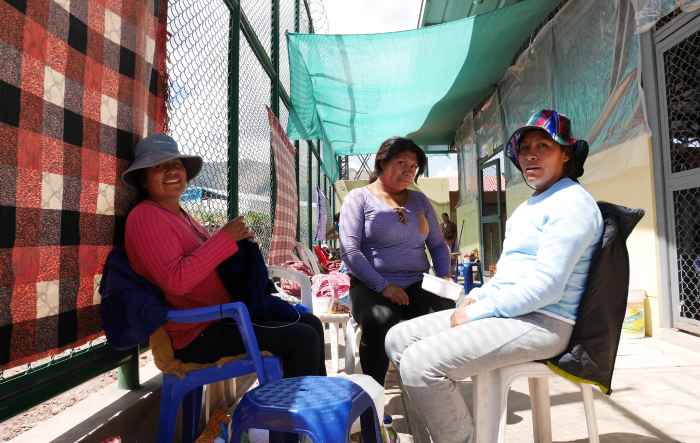
From the prison in Cusco to Vogue cover story
Cusco, Peru, is more than 10.000 km away from Denmark, still, the entrepreneurial women and founders of Carcel had no doubt when they started to set-up their first production in the middle of the South American country. In Peru it’s possible to work with some of the world’s finest and more eco-friendly materials, baby alpaca wool, and at the same time Peru is a country with one of the highest rates of poverty-related crime. These two facts are some of the founding elements for the making of Carcel, and two elements, which have made Carcel a leading brand when it comes to social-fashion-business. And they are already ready to expand. Soon Carcel starts training and production inside a women’s prison in Thailand, as the first international company.
“We have created a new label – which I hope will influence the future fashion industry .”
We have a production that solves some of the challenges in the world and at the same time creates a cool and appealing brand, that proves what fashion is capable of. Fashion is fundamental. It has always been a revolutionary industry, a way to express yourself, but now have become a fragmented industry based on invisible structures and complicated systems – it’s simply out of time”, explains 34-years old Veronica D’Souza, CEO and Founder of Carcel.
She is the brain behind the company, and together with her strong team of women, she shows that it is possible to do things differently in the industry. She has set up a company that embraces the knowledge of the locals, repeats the heritage of crafts, prioritises natural materials and helps women break the spiral of poverty. Being able to improve the industry demands changing behaviours all the way from the producers to the end-consumers, who have been educated to over-consume though constant collections and sales, in contrast to this Veronica D’Souza explains:
“We need to design products, and brands, that can inspire and tell stories that make people more engaged and desired. We can’t be judgemental, negative and neglecting – we have to all move away from that. Instead we should create new opportunities and show the way to change”.
This approach has made Carcel a role model for the fashion revolution, which is moving fast and this trendsetting company has already marked themselves on the global scene. Magazines like Vogue (https://www.vogue.com/article/fashion-runway-carcel-copenhagen-launch) as well as many international newspapers and publications have discovered the unique Danish label. It is very important for Carcel to get this attention – but even more important – this attention is very important for the women in prison.
“It is ground breaking that these women, suddenly have become the cover story on Vogue for being the producers of this cool brand from Copenhagen”, D’Souza points out.
For her, these women’s futures have been fundamental from the beginning. This is stated in Carcel’s garments as each of the styles carry the name of the woman who made it.
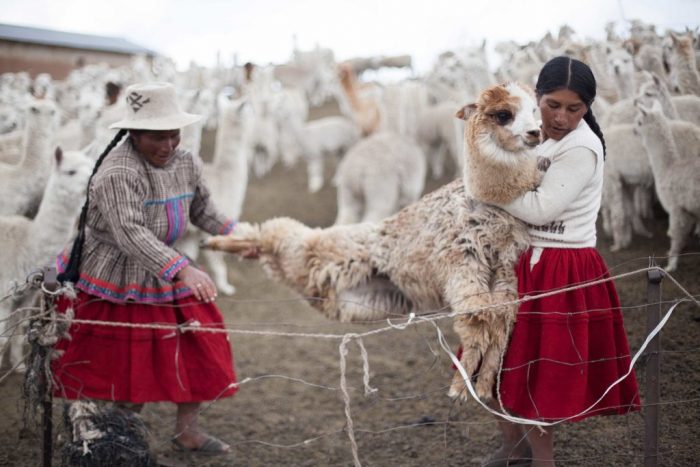
The neckline label supports the story
In the women’s prison, just outside Cusco in Peru, Edith sits on a wooden chair. She is concentrated with the details finishing a navy alpaca jumper. The label that carries her name is added in the neckline and together with the printed card that tells her story, the jumper is ready to be sold.
The fact that each style carries the name of the woman who made it is a very great part of Carcel’s brand identity and it sets high standards for the industry. Also, this has a special meaning for D’Souza.
“A grandmother once told me, that she was always thinking of the person she was knitting for. The craft is like a human wonder. So much love is attached in creating something for someone and as well as receiving something from someone. Today, knitwear is often made in a very technological set-up, where a recipe is added, a button is pushed and then comes out 250 pieces. Without character and without any human hands involved. We do this differently: when you receive your knitwear from us you will also get a printed card illustrating and telling the story of the woman who made it.”
Veronica D’Souza has a background as social entrepreneur and has always worked with an overall focus on improving lives for women, believing that: if you help a woman, you help a whole family and society. The main difference of female incarceration to that of men’s is that women are often in prison for poverty-related crime.
In Peru, drug trafficking is one of the main reasons for female incarceration and what forces them is the will and need to support their children and families. The sentences are usually between 5 and 18 years and while being incarcerated, the women often lose their providing family role. However, this completely changes when the women have the opportunity to get a well-paid job, which makes them able to send their children to school and save up for a crime-free beginning while being in prison.
On top of this, these women are obtaining new skills and they exercise craftsmanship, which they can use in society. For the women, working for Carcel has long term effect and means new opportunities in life. Not only for themselves, but for their entire families.
“We try to provide them with the dignity of creating exclusive designs and products, while also creating better conditions for some of the most marginalised women in the world.”
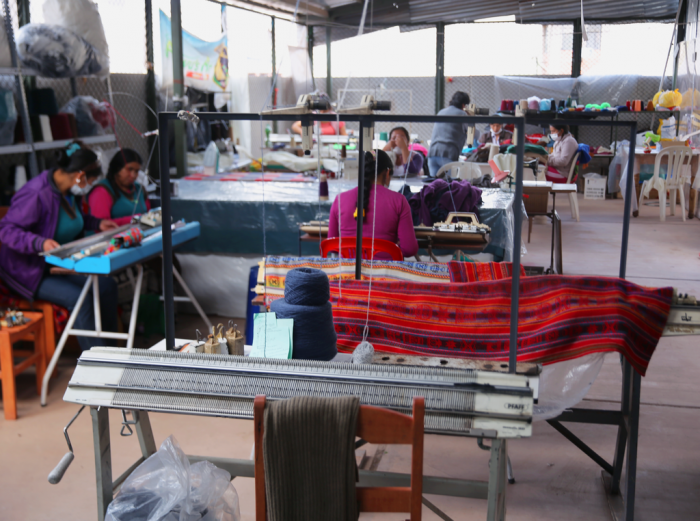
Production based on knowledge and responsibility
Edith is one of the many women who grew through her employment at Carcel in Cusco. And today she even creates her own knitting recipes. She sends back money to her mom who is sick. And her mom has a special role in this story. Edith is an amazing example of the long heritage of knitting tradition in Peru, as this knowledge has given her an extraordinary understanding of the material, which is very essential for the women and the production.
“The women in Peru are a part of a long tradition working with alpaca wool, which, through generations, has made the Peruvians some of the world’s most skilled knitters. This is a strong argument for our quality and the fact that people should buy Carcel because of design and materials – not only to support the women in prison”, points D’Souza and continues:
“We have created our very own production and we’ve asked ourselves: ‘how can we create the greatest production in the world – ensuring good wages, conditions and training?’. And then it’s about goodwill. We are a human-oriented company and it is very crucial that we make long term plans and ensure a healthy environment. We have full responsibility for the production, therefore we are very careful when it comes to up-scaling because we also have the full responsibility getting the products sold. Our greatest responsibility is to keep the women employed and keep them busy. The social approach to sustainability is key to running a sustainable business”.
Carcel is already expanding production to a women’s prison in Thailand and the set-up is the same. Backstage in the company is a lot of resources used on research and development where the team “maps” the world for coming productions based on where high rated of female incarceration meets some of the world’s best materials. Places where the native traditionsl, resources and material expertise, like silk in Thailand, can become the foundation of the production. This set up requires a lot of research and knowledge and being present in the country.
“We start the training inside a women’s prison in Chiang Mai, Thailand, very soon and we will be there every single day for the coming six months. Here we will get to know them very well and we will develop our production framework together. We often say that we have a fully online business and sales channel and maybe the most off-line production possible. The thing is, we cannot just call them – we basically have to be there physically.”
In Peru Carcel has hired a German production manager, who visits to prison every day.
Like the alpaca styles from the Andes, Carcel’s Thailand production will produce seasonless collections, limited batches and will only produce based on demand.
“We produce what we sell, and launch new styles and colours no matter the season. This means that we can produce smaller and more specific batches, which ensures no overstock and waste in the supply chain. Growing trends within sustainable fashion are often focused on materials, which is very important, but we have to re-think season-based collections and start telling the consumer how many products go to waste because they are ‘out of season’”.
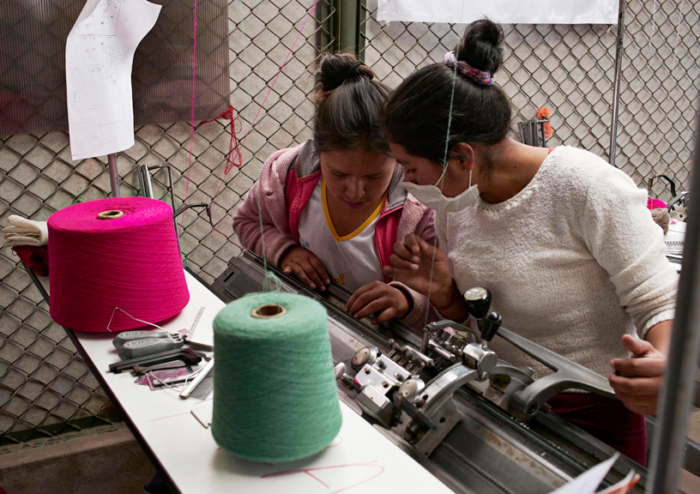
The rise of the fashion-revolution
Veronica D’Souza is optimistic about the future. Both when it comes to consumer habits and buying behaviours and the entire structure of the fashion industry. She’s convinced that we will soon face higher demand for transparency and visible structures and that technology will make it impossible to hide dirty productions, poor CSR-reports and cheap solutions.
“When this happens, it will be a revolution changing everything. As soon as the consumers are able to scan everything and know every process behind a product all companies have to adapt, develop and change dramatically. This will be more revolutionary than any governmental proposal. When the consumers start to ask questions, companies have to be able to answer. Can you then justify for your choices? Let me just say: dear industry – get ready!”
Fashion Revolution Denmark met Veronica D’Souza at Carcel’s creative studio in Copenhagen. We appreciate the interview and look forward to following their future development and we hope that more brands will do the same as Carcel.
#WhoMadeMyClothes
*Spanish for prison
